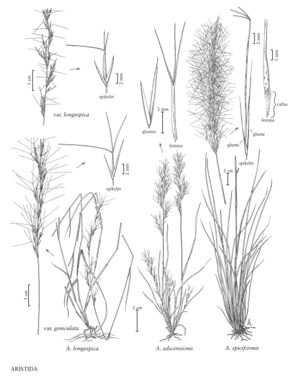Difference between revisions of "Aristida longespica"
FNA>Volume Importer |
FNA>Volume Importer |
||
| Line 16: | Line 16: | ||
-->{{Treatment/Body | -->{{Treatment/Body | ||
|distribution=Conn.;N.J.;N.Y.;Ala.;Ark.;Del.;Ga.;Md.;N.C.;S.C.;Tenn.;Va.;W.Va.;Iowa;Minn.;Ohio;Wis.;Mass.;N.H.;Ont.;Fla.;Tex.;La.;Pa.;S.Dak.;Ariz.;D.C;Wash.;Colo.;Vt.;Ill.;Ind.;Kans.;Nebr.;Okla.;Mo.;Mich.;R.I.;Miss.;Ky. | |distribution=Conn.;N.J.;N.Y.;Ala.;Ark.;Del.;Ga.;Md.;N.C.;S.C.;Tenn.;Va.;W.Va.;Iowa;Minn.;Ohio;Wis.;Mass.;N.H.;Ont.;Fla.;Tex.;La.;Pa.;S.Dak.;Ariz.;D.C;Wash.;Colo.;Vt.;Ill.;Ind.;Kans.;Nebr.;Okla.;Mo.;Mich.;R.I.;Miss.;Ky. | ||
| − | |discussion=<p>Aristida longespica grows along roadsides and in waste places, sandy fields, and clearings in pine and oak woods of southern Ontario and the eastern and central United States. The two varieties have a similar geographic range and are often found growing together.</p> | + | |discussion=<p><i>Aristida longespica</i> grows along roadsides and in waste places, sandy fields, and clearings in pine and oak woods of southern Ontario and the eastern and central United States. The two varieties have a similar geographic range and are often found growing together.</p> |
|tables= | |tables= | ||
|references= | |references= | ||
| Line 51: | Line 51: | ||
|publication year= | |publication year= | ||
|special status= | |special status= | ||
| − | |source xml=https://jpend@bitbucket.org/aafc-mbb/fna-data-curation.git/src/ | + | |source xml=https://jpend@bitbucket.org/aafc-mbb/fna-data-curation.git/src/8f726806613d60c220dc4493de13607dd3150896/coarse_grained_fna_xml/V25/V25_1005.xml |
|subfamily=Poaceae subfam. Aristidoideae | |subfamily=Poaceae subfam. Aristidoideae | ||
|tribe=Poaceae tribe Aristideae | |tribe=Poaceae tribe Aristideae | ||
Revision as of 16:27, 18 September 2019
Plants annual. Culms 15-65 cm, erect to spreading, often geniculate-based, sometimes nearly prostrate, usually much-branched. Leaves cauline; sheaths shorter than the internodes, not disintegrating into threadlike fibers at maturity, glabrous or sparsely pilose, hairs on the throat sometimes to 5 mm; collars glabrous; ligules about 0.5 mm; blades 5-14 cm long, 1-2 mm wide, flat to loosely involute, light green. Inflorescences usually paniculate, occasionally racemose or spicate, 6-22 cm long, 1-4(6) cm wide; nodes glabrous or with straight hairs, hairs to 0.3 mm; primary branches 1-4 cm, appressed to erect, rarely somewhat spreading distally, without axillary pulvini, with 2-5 spikelets per branch. Spikelets widely spaced to crowded. Glumes 2-11 mm, subequal, 1-veined, acuminate, unawned or awned, awns to 1 mm; calluses less than 1 mm; lemmas 2.5-10 mm, gray to dark purplish-brown, often horizontally banded or mottled, scabrous-hispid or glabrous, not beaked, apices only slightly narrowed, junction with the awns not evident; awns usually unequal, terete and curving up to 100° at the base, erect to reflexed distally, not disarticulating at maturity; central awns 1-27 mm; lateral awns absent or to 18 mm, shorter than the central awns; anthers 1 and 0.2-0.3 mm, or 3 and 3-4 mm. Caryopses 3-4 mm, light brown. 2n = unknown.
Distribution
Conn., N.J., N.Y., Ala., Ark., Del., Ga., Md., N.C., S.C., Tenn., Va., W.Va., Iowa, Minn., Ohio, Wis., Mass., N.H., Ont., Fla., Tex., La., Pa., S.Dak., Ariz., D.C, Wash., Colo., Vt., Ill., Ind., Kans., Nebr., Okla., Mo., Mich., R.I., Miss., Ky.
Discussion
Aristida longespica grows along roadsides and in waste places, sandy fields, and clearings in pine and oak woods of southern Ontario and the eastern and central United States. The two varieties have a similar geographic range and are often found growing together.
Selected References
None.
Key
| 1 | Central awns 8-27 mm long, lateral awns usually 6-18 mm long | Aristida longespica var. geniculata |
| 1 | Central awns 1-14 mm long and/or lateral awns usually 0-5 mm long | Aristida longespica var. longespica |
